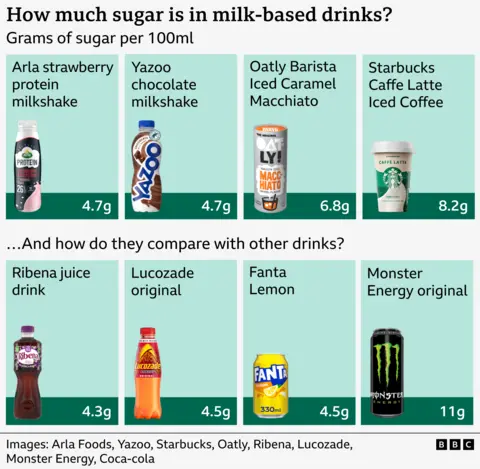Archie MitchellBusiness reporter
 Getty Images
Getty ImagesThe chancellor has announced her Budget which includes a freeze to income taxthresholds, a rise in minimum wages and a so-called milkshake tax.
Here are nine ways Chancellor Rachel Reeves’ Budget might affect you if you are 25 or under.
Minimum wage workers will benefit
Minimum wages will go up from April with 18 to 20-year-olds getting the biggest pay rise.
Their hourly rate will go up by 85p to £10.85, while under-18s and apprentices will see a 45p uplift to £8 an hour. Over-21s will get a rise of 50p per hour to £12.71.
Reeves said 2.7 million people will benefit from these increases.
More broadly, the government is trying to bring minimum wages for 18 to 20-year-olds in line with workers aged 21 and over.
But businesses have warned that the increases could push up prices and lead to a freeze on hiring.
Think tank the Resolution Foundation said the “unnecessarily big” rise for under-21s specifically could make it harder for 18 to 20-year-olds to find work.
Student loan repayment thresholds frozen
The chancellor has frozen the threshold at which student loans must be paid back from 2027-28.
The threshold is currently £28,470 for those with loans taken out from September 2012 onwards in England or Wales.
This means each year, workers earning above that amount will be dragged into making larger repayments on their student loans than they would have if thresholds rose in line with inflation.
Student loan repayments typically amount to 9% of their incomes over a given threshold each month.
Reeves also unveiled a new international student levy, which will see universities charged £925 per overseas student per year from August 2028, with an exemption for 220 students per year.
The income raised by the levy will be used to fund maintenance grants for disadvantaged students studying so-called priority courses such as university degrees and technical qualifications.
Private renters expected to be hit
The chancellor made an appeal to renters in her Budget speech, saying it is unfair that income from work is taxed more than income made by landlords.
Reeves set out plans to raise the tax rate on income from properties by 2%.
But the changes risked contributing to “a steady long-term rise in rents”, the official forecaster the Office for Budget Responsibility (OBR) warned.
This is because landlords may leave the private rental market, limiting supply and pushing up prices for renters, it said.
Young people will be helped into work
The chancellor set aside £1.5bn over the next five years to help 16 to 24-year-olds into work or training.
Reeves said £820m will go towards her guarantee to offer paid work placements to young people who have been out of work, education or training for 18 months.
It is part of a drive by the government to reduce the number of people out of work, with those who refuse to take up the offer facing the threat of being stripped of their benefits.
A further £725m will go towards making the training of under-25 apprentices free for small and medium sized firms.
 Getty Images
Getty ImagesSome online shopping to get more expensive
The chancellor’s decision to scrap a tax loophole on small parcels could see some online shopping get more expensive from 2029.
The “de minimis” loophole allows overseas retailers to send goods to the UK worth up to £135 without incurring customs duty.
British retailers have been highly critical of the loophole, arguing it undercuts high street firms, and wanted the change to be introduced sooner.
It means brands that benefit from this loophole, like Shein and Temu, are likely to up their prices when it’s closed.
Iced lattes and fizzy drinks to fall under sugar tax
If you grab a pre-made latte with your lunch or a protein shake on the way back from the gym you could be hit by the so-called milkshake tax.
Pre-packaged milkshakes and coffees with high sugar content will face an extra tax from 2028.
The threshold at which the sugar levy applies will be 4.5g of sugar per 100ml, down from 5g.
The change, part of a bid to tackle childhood obesity, could mean an extra tax on popular products like Yazoo, Muller’s Frijj and Starbucks Caffe Latte as well as drinks branded “high protein” like Ufit and Shaken Udder.

First-time buyers to be helped with savings
Reeves promised a “new, simpler” way to help first-time buyers onto the property ladder.
There will be a consultation in early 2026 on what could be a replacement for the Lifetime Isa (Lisa).
Anyone under 40 can open a Lisa to either help save towards retirement or buy a first home. Savers can put in up to £4,000 a year and the government will top it up by 25%.
Frequent complaints about the Lisa include that savers face a penalty for withdrawing money early, meaning they could lose 6.25% of their own savings.
Critics have also called for the £450,000 threshold for properties eligible to be purchased using a Lisa to be increased, having been unchanged since 2017.
The consultation could also see the retirement aspect of Lisas removed in favour of focusing solely on first-time buyers.
Rail fares in England frozen
If you use trains or buses to get about then the good news is fares won’t be going up for now.
For the first time in three decades, the chancellor announced that regulated rail fares in England will be frozen until March 2027.
Typically the fares, which include season tickets for most commuter routes, are uprated in line with inflation plus 1%. The most recent increase, in March 2025, was 4.6%.
The bus fare cap of £3 for a single journey, covering most bus journeys in England, is already in place until March 2027.




